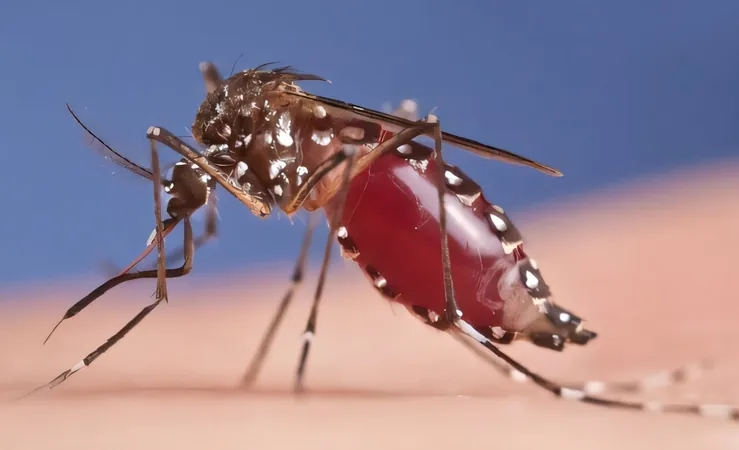
Groundbreaking Bacteria Discovery Could Revolutionize Mosquito Control Efforts!
2024-11-05
Author: Emily
Introduction
In a remarkable new study, scientists have unearthed how specific bacteria can enhance the growth rates of mosquito larvae, presenting a promising breakthrough for global health initiatives aimed at controlling mosquito populations. The findings could play a crucial role in combating the spread of dangerous diseases like dengue fever, yellow fever, and Zika, all tied to the notorious Aedes aegypti mosquito.
Current Mosquito Control Strategies
Traditional anti-disease strategies often involve the mass breeding and release of non-biting male mosquitoes designed to disrupt the reproductive cycle of their populations. These innovative programs are gaining traction as they can be significantly more effective than traditional insecticide spraying, particularly as many mosquito species have developed a troubling resistance to commonly used chemicals.
Study Insights and Findings
Conducted by experts from the universities of Exeter and Wageningen, the study sheds light on how the Asaia bacteria influence mosquito larvae development. Astonishingly, the presence of Asaia bacteria reduced the larval development time by a full day. This acceleration could greatly enhance mass-rearing efforts that require the production of millions of adult mosquitoes.
Published Research
Published in the prestigious Journal of Applied Microbiology, the research paper is titled "Asaia spp. accelerate development of the yellow fever mosquito, Aedes aegypti, via interactions with the vertically transmitted larval microbiome." Professor Ben Raymond of the University of Exeter emphasized the significance of microbiomes in the life cycle of mosquito species, noting that "every species, including humans, depends on a microbiome—a complex mix of microorganisms living within."
Role of Asaia Bacteria
The study's findings reveal an essential role for Asaia bacteria, which had previously been suggested as advantageous members of mosquito microbiomes but not extensively tested for Aedes aegypti. Notably, it was established that these larvae cannot develop without a functioning microbiome, and the introduction of two Asaia species has beneficial effects on their growth.
Development Period Reduction
Typically, Aedes aegypti larvae develop over a period of around 10 days, making a reduction of even a single day an appealing advancement for large-scale production. During the study, Asaia bacteria were introduced to the water used for larval development, accelerating their growth.
Mechanism of Action
While the exact mechanism remains unclear, the researchers point out that the bacteria do not appear to provide direct nutritional advantages. Instead, the influence of Asaia bacteria reshapes the overall bacterial community within the larvae, decreasing the prevalence of certain microbial species, some of which are parasitic.
Conclusion and Outlook
Moreover, Asaia bacteria also help deplete oxygen levels in the water, fostering an environment conducive to the production of hormones that further encourage faster development. As scientists continue to explore the intricate dynamics of mosquito microbiomes, this groundbreaking research opens the door to innovative mosquito control solutions that could save countless lives by preventing the diseases carried by these pests. The battle against mosquito-borne illnesses has taken a significant leap forward—will this discovery be the game-changer we’ve been waiting for? Stay tuned!









 Brasil (PT)
Brasil (PT)
 Canada (EN)
Canada (EN)
 Chile (ES)
Chile (ES)
 España (ES)
España (ES)
 France (FR)
France (FR)
 Hong Kong (EN)
Hong Kong (EN)
 Italia (IT)
Italia (IT)
 日本 (JA)
日本 (JA)
 Magyarország (HU)
Magyarország (HU)
 Norge (NO)
Norge (NO)
 Polska (PL)
Polska (PL)
 Schweiz (DE)
Schweiz (DE)
 Singapore (EN)
Singapore (EN)
 Sverige (SV)
Sverige (SV)
 Suomi (FI)
Suomi (FI)
 Türkiye (TR)
Türkiye (TR)